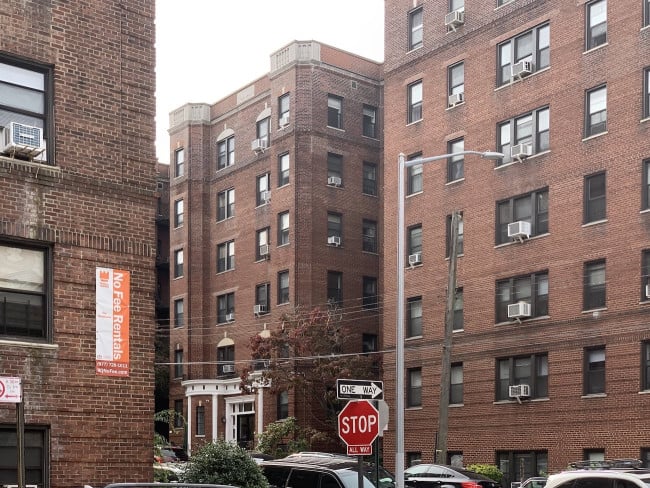5 things NYC tenants need to know before going on a rent strike
- A rent strike is used to force a landlord to fix dangerous conditions in an apartment building
- It’s a good idea to hire a lawyer who can help you navigate your case in housing court
- Set aside your rent, ideally in a separate account, in case you have to pay it back

A rent strike is a last resort for tenants who need their landlord to fix serious safety issues.
iStock
There are several steps involved in getting your New York City landlord to make repairs. You can send them a formal letter. You can get your fellow tenants to complain. You can call 311. You can file an HP Action in Housing Court to force them to make fixes. But if all this fails, it might be time to consider another option: a rent strike.
Rent strikes—when tenants collectively withhold rent to force their landlord to make repairs—are rare in NYC, and require a lot of cooperation and trust between tenants. A rent strike is often a last resort for tenants who need their landlord to fix serious, even life-threatening issues.
“Where the conditions are bad enough and the landlord is plain intransigent would make me think a rent strike is worth considering,” said Alex Jacobs, an attorney at Legal Services NYC. “It doesn't mean it's going to be the best option, but it's something to think about.”
It’s a risky move because a landlord will usually sue tenants for nonpayment of rent in housing court, where they get a chance to explain to a judge the poor conditions they are seeking to get fixed. In the best case scenario, you could win a rent abatement and get the repairs you need.
But if you lose in housing court, you could be ordered to pay back rent, and tenants who embark on a rent strike can end up on the tenant blacklist—when tenant screening companies identify tenants who have been involved in a housing court case.
All in all, a rent strike is something you and your fellow tenants should consider carefully. Read on for five steps you should take before you go on strike.
1. Have a clear goal
Tenants need to explain clearly to their landlord why they’re striking—for example, to get repairs, restore a building’s heat, or remedy other unsafe conditions.
For instance, some tenants of a Flatbush apartment building went on strike last month over leaking walls, peeling paint, and rooms they claim their landlord illegally converted, CBS News reported. And last year, tenants on the Upper West Side went on a rent strike, alleging that their building was rife with mice, roaches, and bedbugs among other structural problems, the New York Post reported.
For two Crown Heights tenants, Vincia Barber and Angela Robinson, their goal was securing repairs for their apartments—and they have scored some.
Barber and Robinson both live at 1616 President St. in Brooklyn. The two, plus a few of their neighbors, have been on rent strike for nearly five years since their landlord, one of the city’s “worst” according to the NYC Public Advocate, let their building fall into disrepair and then sold it in 2022.
Robinson said her new landlord, Gilman Management, renovated her kitchen, but after that remodel, brown water started coming out of her kitchen faucet. Meanwhile, Barber said her newly repaired bathroom walls began to crack just a few weeks after being fixed.
The two are still on strike with the goal of getting more significant repairs, plus a rent abatement.
“We’re not taking this nonsense,” Robinson said. “We’re not giving up on this strike.”
David Graber, an attorney representing the landlord in housing court, told Brick Underground in December that while there have been issues at the building, Gilman has made significant repairs and that the brown water was a result of fixing the building’s boiler, and has since been resolved.
2. Know your building’s stabilization status
Even if your rent strike is successful, your landlord might still want you out at the end of your lease.
Tenants in market-rate buildings can lose their apartments when a landlord declines to renew their leases, while rent-stabilized tenants usually have a right to renew, said Jason Blumberg, a staff attorney at the legal aid organization Mobilization for Justice.
“It might not even get litigated because the landlord might just decline to renew your lease,” Blumberg said.
But if you live in a rent-stabilized unit, you’re entitled to an automatic renewal in most cases and your rent increases are capped by NYC’s Rent Guidelines Board. It’s less likely that a rent strike will jeopardize your right to keep your rent-stabilized apartment. If you’re not sure if you’re rent stabilized, you can request your rent history from the Department of Housing and Community Renewal by email or postal mail, or use nonprofit Just Fix’s easy online tool.
You should also check to see if you’re covered by the state’s new Good Cause eviction law, which gives tenants a right to renew their leases if their landlord lacks a good reason to evict them.
But it’s worth noting that Good Cause does not offer tenants the same protections from eviction as rent stabilization, and has only been used as a defense in housing court a handful of times. It’s yet unclear if Good Cause will protect tenants who decide to withhold rent to get repairs, Blumberg said.
3. Determine who is committed to a strike
A rent strike is a big decision, and it might not be for everyone.
“Be honest with your fellow tenants,” said Elizabeth Reardon, a senior staff attorney at Brooklyn Legal Services, who represents the striking tenants at 1616 President St. “If you’re not interested in a rent strike, say it.”
A rent strike is a numbers game. The more tenants that are on strike, the more leverage they have, Reardon said. That leverage can shrink when tenants move out or cut a deal with their landlord, so it’s best to be certain that you have the numbers to sustain a strike.
You should also expect your landlord to attempt to break up the strike by making individual deals with tenants, Jacobs added.
“Many times, a landlord can try to pick off individual tenants here and there with promises that sound superficially good but wind up undermining the common cause of a tenant association,” Jacobs said. “A major factor for tenants is to remain united, resolute, and committed.”
4. Set aside your rent money
Withholding rent means your landlord will likely sue you in housing court in what’s known as a nonpayment case. While the case is ongoing, you should avoid spending your rent money, Reardon said.
Tenants who decide to go on a rent strike should put their rent funds aside in a separate bank account or in a lawyer’s escrow account, so that if a judge orders you to pay back the funds, you can do so immediately and avoid being evicted.
“The worst outcome is that you owe them all the money you withheld,” Reardon said. “If you don’t have a bank account, keep the rent you’re withholding in money orders in a safe place. If you have a lawyer, you can keep the money in an escrow account.”
5. Seek outside help
A rent strike is just the start of what will become a more complex legal process. You should get an attorney to argue on behalf of you and your fellow tenants in housing court.
“Having legal aid attorneys is really important to be able to navigate that really, intentionally complicated and bureaucratic system,” said JohnAugust Bridgeford, a tenant organizer with Housing Organizers for People Empowerment (HOPE) who works with the tenants at 1616 President St.
An attorney can help you figure out how to argue your case in housing court. For example, the tenants at 1616 President St. are using an unusual legal defense called a rent impairing violation defense—a way to secure a rent abatement by arguing that the conditions of your apartment were so dangerous they prohibit your landlord from collecting rent. (It’s not commonly used because it requires tenants to deposit the money their landlord claims they owe with housing court, Reardon said.)
They’ve been somewhat successful: A judge awarded two of the tenants a roughly two-year rent abatement of nearly $36,000 at the end of last year, although Graber has challenged both awards, according to court records. None of the rent has been returned to tenants yet, Bridgeford said.




























